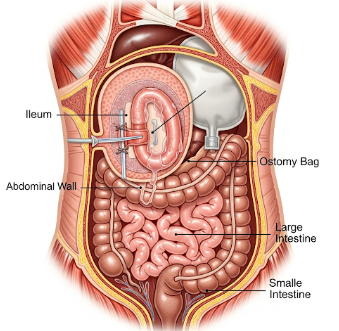Overview
An ileostomy is a surgical procedure that creates an opening (stoma) in the abdominal wall to allow waste to exit the body from the small intestine, bypassing the colon and rectum. This procedure is often necessary for patients with inflammatory bowel disease (IBD), colorectal cancer, familial polyposis, or bowel obstruction.
South Korea is renowned for advanced gastrointestinal surgery, specialized stoma care, and high-quality post-operative rehabilitation, making it a preferred destination for patients seeking safe, effective ileostomy procedures with comprehensive aftercare.
What is an Ileostomy?
An ileostomy involves:
- Diverting the small intestine (ileum) to a surgically created stoma on the abdominal wall
- Waste is collected in an external pouch, which can be emptied or changed regularly
- Temporary or permanent options depending on the underlying condition
- Performed using open or minimally invasive laparoscopic techniques
Indications include:
- Inflammatory bowel diseases like Crohn’s disease or ulcerative colitis
- Colorectal cancer requiring removal of part of the colon or rectum
- Congenital or acquired bowel disorders
- Bowel obstruction, trauma, or perforation
- Preventive measures after high-risk surgeries
What are the Benefits?
- Bypasses diseased or damaged colon → Reduces pain, inflammation, and risk of infection
- Protects healing after bowel surgery → Allows bowel rest and recovery
- Improves quality of life → Enables controlled waste management
- Minimally invasive surgical options → Shorter recovery and reduced post-operative pain
- Expert care in Korea → High surgical success rates and low complication rates
- Personalized stoma care and education → Improves independence and daily living
Procedure Details
1) How should I prepare for an Ileostomy?
- Preoperative evaluation → Blood tests, imaging, colonoscopy, and medical history review
- Bowel preparation → May include fasting or bowel cleansing before surgery
- Medication review → Adjust blood thinners or anti-inflammatory medications
- Preoperative consultation → Discuss type of ileostomy (temporary vs permanent), stoma site, and lifestyle adjustments
- Lifestyle adjustments → Smoking cessation, hydration, and nutritional preparation for surgery
2) What happens during the Ileostomy procedure?
- Anesthesia → General anesthesia
- Surgical steps →
- Small or large incision depending on open or laparoscopic technique
- Diseased section of bowel removed or bypassed
- Ileum brought through abdominal wall to create a stoma
- Stoma sutured securely and external pouch applied
- Duration → 1–3 hours depending on complexity
- Monitoring → Vital signs and anesthesia closely monitored
3) What happens after an Ileostomy?
- Immediate recovery → Patient monitored for vital signs, stoma output, and wound healing
- Hospital stay → Typically 5–10 days depending on surgery type and patient condition
- Pain management → Oral or IV analgesics, minimally invasive techniques reduce pain
- Activity restrictions → Avoid heavy lifting for 4–6 weeks, gradual return to daily activities
- Stoma care education → Patients trained to manage pouch, emptying, hygiene, and skin care
- Follow-up visits → Wound check, stoma assessment, and guidance on diet and lifestyle
Risks / Benefits
Risks
- ➤ Infection at surgical site or stoma
- ➤ Bleeding or hematoma
- ➤ Stoma complications (retraction, prolapse, or skin irritation)
- ➤ Bowel obstruction or hernia around stoma
- ➤ Nutritional deficiencies due to altered absorption
- ➤ Psychological adjustment and lifestyle changes
Benefits
- ➤ Restores bowel function and reduces disease complications
- ➤ Enables controlled waste management
- ➤ Protects healing after bowel surgery
- ➤ Minimally invasive approaches reduce recovery time and pain
- ➤ Expert post-operative care in Korea ensures long-term success
Recovery and Outlook
- Immediate recovery → Pain, swelling, and mild discomfort around stoma for a few days
- Hospital stay → Typically 5–10 days
- Return to normal activity → Gradual, light activity after 2–3 weeks; full recovery in 6–8 weeks
- Long-term outlook → Most patients achieve improved quality of life, disease control, and independent stoma management
- Post-operative care → Daily stoma care, dietary adjustments, and monitoring for complications
- Lifestyle adjustments → Nutrition management, hydration, and support groups for adaptation
South Korea provides comprehensive ileostomy rehabilitation programs, including dietary guidance, stoma care training, physiotherapy, and psychological support.
When To Call the Doctor
Contact your surgeon or stoma nurse immediately if you notice:
- ⚠️ Excessive bleeding or swelling around the stoma
- ⚠️ Foul-smelling discharge or signs of infection
- ⚠️ Sudden change in stoma output (no output or excessive output)
- ⚠️ Severe abdominal pain or vomiting
- ⚠️ Skin irritation or ulceration around stoma
- ⚠️ Emotional distress affecting daily function
Best Korea Option / Process
South Korea is a leading destination for ileostomy surgery and rehabilitation due to:
- Expert colorectal and gastrointestinal surgeons
- Advanced minimally invasive surgical technology
- Comprehensive stoma care education and training
- Integration with nutrition, physiotherapy, and psychological support
- International patient services → Coordination, translation, and follow-up guidance
Top Hospitals for Ileostomy in Korea:
- Asan Medical Center, Seoul – Expert colorectal surgery and stoma management
- Samsung Medical Center – Minimally invasive ileostomy with comprehensive rehabilitation
- Seoul National University Hospital (SNUH) – Full pre- and post-operative care
- Yonsei Severance Hospital – Multidisciplinary support for stoma care and adaptation
👉 For patients with IBD, colorectal cancer, or bowel obstruction, Ileostomy in Korea provides safe, effective, and patient-centered surgical care with expert post-operative management and rehabilitation.













